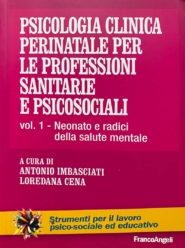
Perinatal Clinical Psychology for health and psychosocial workers: mental health roots in the newborn
For the past twenty years the Authors developed a particular discipline they designed Perinatale Clinical Psychology from 2003: a clinical psychology applied to the vicissitudes that happen before,during and later conception, pregnancy, delivery, puerperium, breast feeding, infant care, early infancy. These vicissitudes concern the couple, the pregnant women, the mother, the family, in their growning up a baby and child, and all the health workers which operates in perinatale period. Obstetricians, Midwifers. Gynaechologists, Paediatricians, Neonatologists, Social Workers, Biologists, Genetists,Endocrinologists and other scientists and operators meet Psychology in contributing to a psychosomatic view on the psychic and phisics growing up of a new human person. Perinatal Clinical Psychology is characterized by research on brain and mind development in foetal, neonatal and early unfancy period, and needs a multidisciplinary professional training of all its operators, so that they can work in order to prevent psychic and phisics diseases by aiding families for a better child growing up. Psychoanalysis, Neuroscence and Infant Research are the reference frame in which other scences find their particular collocation.
The brain does not develope by Nature (by genome), but by early experience, in particular the interpersonal one. The Authors wrote three volumes describing the human development by focusing on brain and mind constructcting from interpersonal relations with parents and family. Nobody has a brain as another person: no one has the same mind. Nobody has the same destiny in being a healthy person rather than a pathological one, both in their “mindbrain” as in their bodies and social life. Constructing and developing structuring depend on the basis by which an infant brain was constructed by the quality of its caregiver minds. This quality conditions non verbal messages which produce neural connections (“Connectome”) whose functioning is “mind”. In this process the Authors describe the parenthood dimension. Any following development of a mindbrain depends on its early basis: it conditions every ulterior experience. Affective structure, as it had constructed into the brain is the matrix of all future cognitive development and behaviour.
The Authors underline transgenerationality: the importance of a health diseases prevention, both psychic and phisic by helping services for families.The quality of their care conditions the whole devlopment of an infant, child,adult, and of human mankind towards better or worse future generations.
